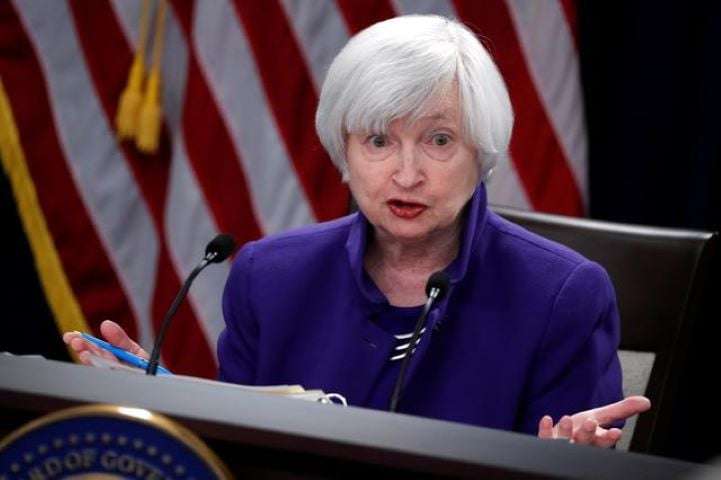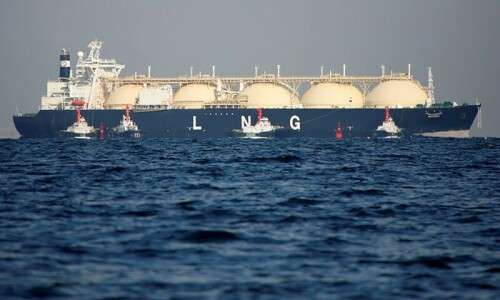Introduction
In an effort to further isolate Russia economically and limit its oil revenue amidst the ongoing conflict in Ukraine, U.S. Treasury Secretary Janet Yellen has indicated that additional sanctions may be imposed. Speaking to Reuters on Friday, Yellen stated that the U.S. government is closely examining the possibility of imposing sanctions on “dark fleet” tankers and has not ruled out targeting Chinese banks. These measures are part of broader efforts to disrupt Russia’s oil trade and weaken its financial standing in the face of international sanctions.
As the conflict in Ukraine persists, the U.S. has been determined to curb Russia’s ability to generate revenue from oil exports, a key economic lifeline for the country. Yellen’s remarks suggest that there could be further actions taken by the U.S. and its allies in the near future, including additional restrictions on maritime services, Russian oil price caps, and more stringent financial sanctions.
The Role of “Dark Fleet” Tankers in Russia’s Oil Trade
What Are “Dark Fleet” Tankers?
“Dark fleet” tankers refer to vessels that operate in secrecy, often transporting oil without registering with international bodies, thus evading sanctions. These tankers play a significant role in helping Russia circumvent the price cap and restrictions imposed by Western countries on its oil exports. Many of these vessels are used to transport Russian oil to countries that are either not part of the sanctions or willing to bypass them. The U.S. has already taken action against individual tankers and their owners, but Yellen’s comments suggest the possibility of expanding these measures to further limit Russia’s oil trade.
The Impact of Dark Fleet Tankers on Russia’s Oil Revenue
The existence of the dark fleet has allowed Russia to maintain access to vital oil revenue despite the global sanctions imposed in response to the invasion of Ukraine. By circumventing the price cap of $60 per barrel, these tankers allow Russia to sell oil to nations like China and India at market prices, bypassing the restrictions designed to reduce Russia’s earnings. This continued trade is critical to Russia’s war effort, and as such, it remains a target for sanctions from the U.S. and its allies.
Sanctions on Chinese Banks: A New Front in the Battle Against Russian Oil
Why Target Chinese Banks?
Chinese banks have come under scrutiny due to their involvement in facilitating Russian oil sales, often through indirect channels that circumvent Western restrictions. The U.S. has already sanctioned various entities linked to Russian oil exports, but Chinese financial institutions continue to engage in transactions that support these exports. Yellen’s comments suggest that the U.S. is considering further measures to curtail this support by targeting Chinese banks involved in these activities. Sanctioning Chinese banks would send a strong message about the U.S.’s commitment to restricting Russia’s ability to generate revenue and further intensify the pressure on Russia’s financial system.
Potential Consequences for Chinese Banks
Imposing sanctions on Chinese banks could have significant ramifications for global trade. China is a major global player in both trade and finance, and sanctions on its banks could disrupt financial transactions between Chinese and international institutions. However, such actions would also highlight the U.S.’s resolve in curbing Russia’s ability to fund its war, especially if these sanctions are tied to the ongoing global efforts to isolate Russia economically.
While the possibility of sanctions on Chinese banks remains uncertain, it is clear that the U.S. is exploring all avenues to reduce Russia’s oil revenues, even if it means targeting major Chinese financial institutions.
The $60 Oil Price Cap: A Crucial Measure to Limit Russia’s Oil Revenue
How the $60 Price Cap Works
The U.S. and its allies implemented a $60-per-barrel price cap on Russian oil as part of broader sanctions to limit Russia’s revenue from oil exports. This cap prohibits Western maritime services and insurance from being provided to cargoes of Russian oil sold above the $60 threshold. By enforcing this price cap, Western countries aim to reduce Russia’s ability to generate income from its oil exports, while still allowing the global oil market to function without significant disruptions.
The price cap has already had an impact on Russian oil revenues, as it restricts the pricing flexibility of Russian exporters. However, despite these efforts, Russia continues to find alternative ways to sell its oil, particularly through the use of dark fleet tankers and by finding willing buyers in countries that are either not subject to sanctions or willing to defy them.
Could the Price Cap Be Lowered?
Yellen’s statement suggests that the U.S. and its allies are considering further reducing the $60 price cap. Lowering the cap would make it more difficult for Russia to sell its oil at market prices, further limiting its revenue and tightening the economic noose around the country. A reduction in the cap would apply additional pressure on Russia’s economy and potentially accelerate the country’s need to adjust its oil exports.
What Would a Lower Price Cap Mean for Global Oil Markets?
While a lower price cap would undoubtedly hurt Russia’s economy, there are concerns about the impact it could have on the global oil market. Reducing the price cap might lead to disruptions in oil supply or price fluctuations, especially in markets where demand for oil remains high. The U.S. and its allies would need to balance these concerns with the goal of cutting Russia’s oil revenue, ensuring that the move does not destabilize global energy markets.
Treasury’s Strategy Moving Forward
Yellen’s Focus on Impairing Russia’s Oil Revenues
As she approaches the final weeks of her tenure as Treasury Secretary, Janet Yellen remains focused on finding ways to reduce Russia’s oil revenues. Her remarks to Reuters underscore the ongoing commitment to isolating Russia economically and limiting its financial resources, which are critical to sustaining its military operations in Ukraine. The U.S. Treasury has already sanctioned individual tankers and entities linked to Russia’s oil trade, and Yellen’s comments suggest that more actions are likely to follow in the coming weeks.
Looking Ahead: The Path to Further Sanctions
Yellen’s interview indicates that additional sanctions on “dark fleet” tankers and Chinese banks are under active consideration. The U.S. will continue to explore all options to reduce Russia’s oil revenue, with the ultimate aim of strengthening Ukraine’s position and weakening Russia’s financial standing. These measures may include tightening existing sanctions or introducing new ones to prevent Russia from accessing foreign markets and securing the revenue it needs to fund its war effort.
Conclusion
The U.S. Treasury’s ongoing efforts to curtail Russia’s oil revenue through sanctions on “dark fleet” tankers and Chinese banks are crucial components of the broader strategy to weaken Russia’s economy and limit its ability to finance the ongoing conflict in Ukraine. Janet Yellen’s recent statements highlight the U.S. government’s commitment to these measures, which include the possibility of lowering the oil price cap and imposing additional sanctions. While the path forward is still unfolding, it is clear that the U.S. and its allies will continue to take decisive steps to isolate Russia financially and hinder its access to vital oil revenue.
Frequently Asked Questions (FAQs)
1. What are “dark fleet” tankers?
“Dark fleet” tankers refer to ships that operate in secrecy, often transporting oil without proper registration, allowing them to bypass sanctions and price caps.
2. Why are Chinese banks a target for U.S. sanctions?
Chinese banks are involved in facilitating Russian oil sales, and imposing sanctions on them would disrupt Russia’s ability to generate revenue from oil exports.
3. What is the $60 oil price cap?
The $60 oil price cap is a measure imposed by Western nations to limit Russia’s oil revenue, prohibiting maritime services and insurance for oil sold above that price.
4. Could the U.S. lower the oil price cap?
Yes, the U.S. and its allies are considering lowering the price cap on Russian oil to further reduce its revenue from oil exports.
5. What impact would sanctions on Chinese banks have?
Sanctions on Chinese banks could disrupt global financial transactions and trade, particularly between China and international institutions, while also curbing Russia’s oil revenue.
ALSO READ
https://flarenews.pk/2024/12/15/india-beat-pakistan-by-9-wickets-in-womens-u-19-asia-cup-opener/



